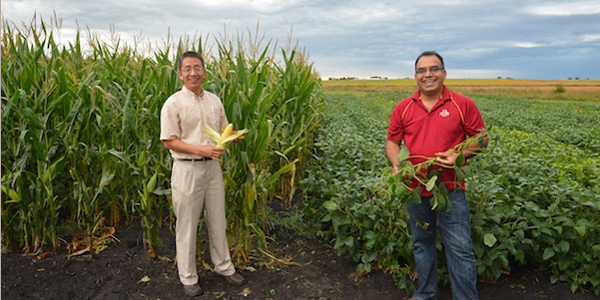
Unlocking New Possibilities For Plants In Each New Generation
Agronomy researchers are using the latest in genomic technology to usher in a new era of plant breeding in a department known for making revolutionary breakthroughs for more than 90 years.
Jianming Yu, associate professor and corn breeding specialist, and Asheesh “Danny” Singh, an assistant professor and soybean breeding expert, joined the agronomy department in 2013.
Kendall Lamkey, agronomy department chair, said the addition of Yu and Singh extends a long tradition of excellence in plant breeding.
“Dr. Yu is one of the top quantitative geneticists in the world and we look forward to the contributions he will continue to make to public and private plant breeding programs,” he says. “Dr. Singh is an outstanding plant breeder who will expand our soybean research capabilities, as well as support the preparation of students for successful careers in agriculture.”
DuPont Pioneer provided the funding for Yu’s position as the Pioneer Distinguished Chair in Maize Breeding.
Yu, who arrived on campus in January, previously worked at Kansas State, studying plant-breeding methods, quantitative genetics and genomics. He earned a bachelor’s degree in agronomy at Northwestern Agricultural University in China, a master’s in plant breeding and genetics from Kansas State, and a doctorate in plant breeding and genetics from the University of Minnesota.
The job description for the position Yu now holds guides his work—“to combine maize breeding with cutting-edge genomic technologies to address significant questions in quantitative genetics, and to develop and improve contemporary breeding methods.”
“To some, this may sound intangible. But to me, it means my team needs to conduct research with great impact, we need to address questions with significance, and our work needs to be original,” he says.
“We saw in 2013 what a cold, rainy spring can do to corn plants, and how much damage a dry, hot summer can have on corn production,” Yu says. “New discoveries will address these types of issues.”
Yu’s teaching duties include courses in plant breeding and genetics. The endowed Pioneer Distinguished Chair in Maize Breeding fund makes it possible for him to host special seminar events, where graduate students can meet with the guest speakers, introduce their own research and ask research and career development questions of experts.
Singh, a Canadian plant breeder, began work in April as the new Monsanto Chair in Soybean Breeding at Iowa State. Previously a research scientist and wheat breeder at the Semiarid Prairie Agricultural Research Centre of Agriculture and Agri-Food Canada, Singh says Iowa State is a world-leading university at the forefront of agriculture research and plant breeding.
“Soybean breeding at Iowa State is well known,” he says. “Soybean is an extremely important crop to Iowa’s production systems, and the uniqueness of the plant and its multiple uses drew me to soybean breeding.”
Singh earned a bachelor’s degree in agriculture and animal husbandry from G.B. Pant University of Agriculture and Technology in India, a master’s in plant breeding and genetics from the University of Saskatchewan, and a doctorate in plant breeding and genetics from the University of Guelph.
Iowa State plant breeding research, with long-standing support of Iowa’s soybean growers, already has led to the development of soybeans with improved yield, disease and insect resistance. Singh plans to build on that progress.
“Our team is working on developing superior packages for farmers for increased productivity and better weed and pest management, as well as improved health profile in our cultivars,” he says.
Singh has two goals—farmers and industry making money from his team’s inventions and training students to become the next generation of plant breeders in private and public institutions.
In September, Iowa State University announced an investment from the Iowa Corn Promotion Board to establish the Iowa Corn Promotion Board Endowed Chair in Genetics. Patrick Schnable, a Charles F. Curtiss Distinguished Professor in Agriculture and Life Sciences, a professor of agronomy and director of Iowa State’s Center for Plant Genomics is the first to hold the chair.
“Big picture, Iowa Corn is launching an industry-wide initiative to develop functional genomic information,” says Bob Bowman, a farmer from DeWitt and president of the Iowa Corn Promotion Board. “We are investing additional funds with Dr. Schnable and researchers at other universities to develop a new public-private collaboration to accomplish this goal. This $2 million investment in both the endowment and functional genomics demonstrates our commitment to this important area of research for Iowa farmers.”
Bowman added, “Iowa Corn has a proud history of working with Dr. Pat Schnable, Iowa State and a coalition of other partners to produce the first sequence of the corn genome.”
Schnable, who has been an Iowa State faculty member since 1988, has led wide-ranging research investigations of the corn genome and has developed a significant number of important genomic tools and resources.
Schnable is a fellow of the American Association for the Advancement of Science, serves as an associate editor for the PLoS Genetics journal and is chair of the American Society of Plant Biology’s Science Policy Committee.
He is a ChangJiang Scholar Professor at China Agriculture University in Beijing. Schnable received his bachelor’s degree from Cornell University and earned his doctorate in plant breeding and genetics from Iowa State. Prior to joining the ISU faculty, Schnable conducted research at the Max Planck Institute for Plant Breeding in Germany.
Read Schnable’s thoughts on the role of “Big Data” in plant genomicsin here: http://stories.cals.iastate.edu/2013/12/the-future-of-agricultural-research-collaboration-in-a-rising-tide-of-data/.



